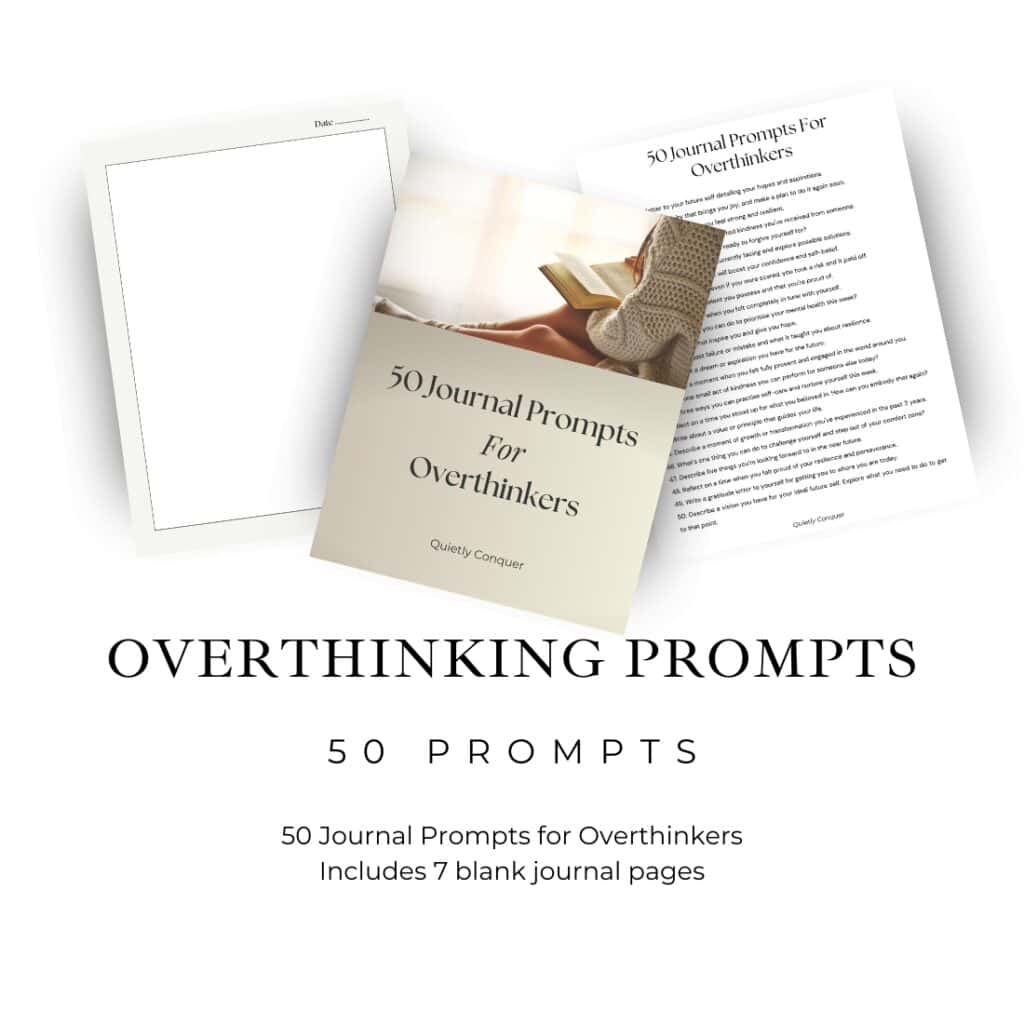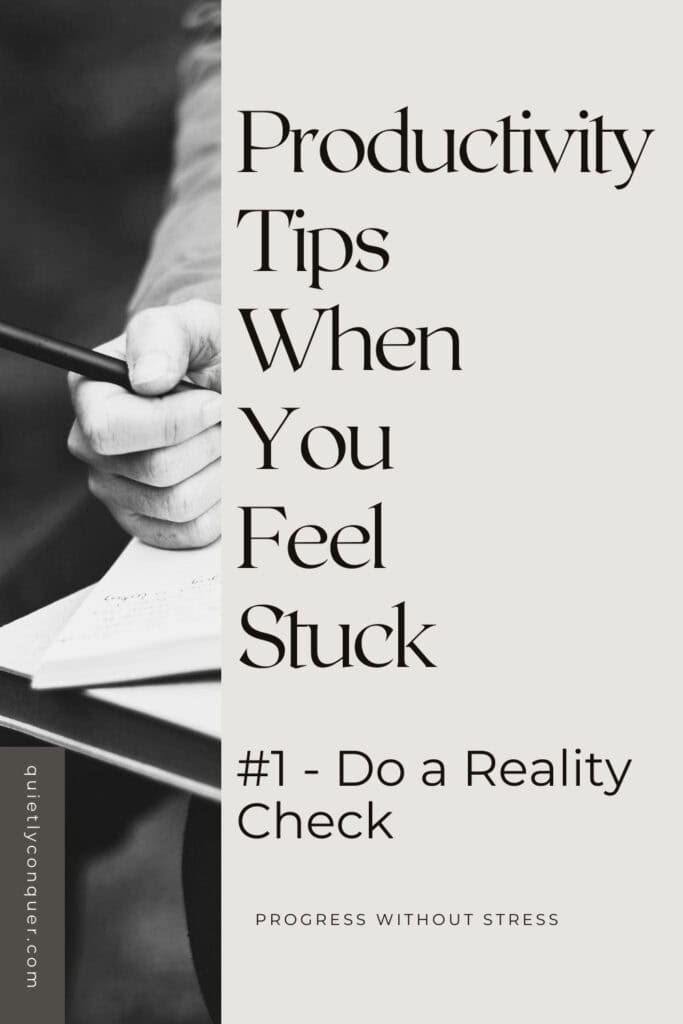Ready to Stop Overthinking? 50 Journal Prompts to Improve Your Confidence

Overthinking Prompts: How Journaling Can Help Improve Your Confidence
Are you stuck in rut overthinking every single thing you need to do? Is it causing you to procrastinate and get stuck in analysis paralysis?
Take a look at how journaling can help with this and grab your 50 overthinking prompts to help you move from being stuck, to feeling clear and confident in yourself and your work.
Table of Contents
What is Overthinking?
Overthinking is something lots of people deal with every single day. If you live with anxiety, self-doubt or low self-esteem, overthinking can be one of the main issues you face. It can mean missed opportunities or not taking a chance on things that could work out brilliantly for you.
Understanding what overthinking is, why it’s happening, and how you can stop it, is essential if you want to increase your confidence and finally achieve those goals.
Overthinking can lead to dreams staying as dreams, instead of becoming solid achievable goals. It can be the reason why you don’t go for that career change, or not take advantage of potential opportunities in business or life.
Overthinking can include ruminating on past mistakes or experiences where you felt like you didn’t do well. It can show up as excessive worry of things that haven't yet happened, or things that you have no control over.
Journaling is a fantastic tool if you're stuck in indecision and overthinking. The 50 overthinking prompts included, can help you move past blocks and guide your journaling practice so you don't need to think too much about what you should write about.
*Affiliate Disclosure: Some links in this post may contain affiliate links. If you purchase something via the link, I may receive a small commission. This doesn't affect the price you pay.
If you have any questions, reach out for a chat [email protected] or check out my other blogs
Are you an Overthinker?
Are you someone who struggles to make a decision? Do you find yourself over analysing and spending excess time considering pros and cons of everything, before you can commit to a decision?
This could be for something as straightforward as what you want to order for your meal on a night out. Or, more significant decisions that can bring significant change to your life. For example, whether or not you should go for a new opportunity, or apply for a job you've always dreamed of.
It’s always good to consider things before jumping in, but when it becomes a sticking point for you, it's important to recognise that this is what's happening. If it's something that stops you from taking the leap, or you can't switch your mind off when you want to relax and take a break, it’s time to put some energy towards finding out what’s really going on.
Impact of Overthinking on Productivity
Overthinking can have a huge impact on productivity. I've found that when I take too long deciding whether it's a good idea, I’ve talked myself out of it and the moment has passed.
Or, when you spend too long in the planning and prepping stage, things simply don’t get done. The step from ideas to planning to taking action needs to be relatively swift and unobstructed. This doesn't mean skipping the planning and preparation part, but it’s about giving yourself a limit on how much time you will spend on it before you start taking action.
When you first get that idea and you feel excited about it, you then need to identify and understand the steps you need to take. It's important to check that it’s viable and worth pursuing. So taking the time to figure out whether your idea has potential and is achievable, is essential.
But, it's important to also be mindful of not getting stuck in that stage because of overthinking and self-doubt.
If you think of yourself as a chronic procrastinator, or you don’t believe in yourself and your ability to achieve success, overthinking is probably what's blocking your progress.
Signs of Overthinking
Some of the main signs of overthinking include:
- Getting stuck in analysis paralysis.
- Second guessing every decision, no matter how significant it is.
- Focusing on things that happened previously, especially things you felt you did wrong or weren’t good enough.
- Worrying about what could go wrong if you made the ‘wrong’ choice.
- Worrying whether you really want to do this.
- Waiting to feel ready before taking action.
- Holding yourself back in case you change your mind.
- Imagining all of the things that could go wrong.
- Racing thoughts, especially at night.
- Needing reassurance from others that you’re doing okay.
- Fear of failure.
- Fear of others judgement.
You may be able to relate to some or all of these, and there may be other things you experience that aren’t included. But a common theme with overthinking, is that you feel blocked and unable to take those steps to move forward.
How to Stop Overthinking
In my work as a counsellor, lots of clients have experienced overthinking because of their lack of belief in themselves. They worry or are anxious about doing things wrong or being judged by others if they do choose to do something.
If your overthinking is related to anxiety or worries like those, I understand that it can be difficult to find a balance between being efficient and responsible, to knowing when it's time to actually make the decision and go for it.
Learning to trust yourself is what's needed when you're living with anxiety, or stuck in self-doubt.
Low self-esteem and a lack of self-belief can fuel these worries, so it's often about learning to regain that sense of self-worth once more.
There are different things you can do to help improve your overthinking and worries, for example:
CBT Tools – Cognitive Behavioural Therapy (CBT) can help you understand the relationship between thoughts, beliefs and action. There are plenty of self-help books and resources available that you can print off and use at home. Visit the Quietly Conquer Store on Etsy for a range of mental health, productivity and journaling tools.
Therapy – If you find it difficult to manage these yourself, working with a professional counsellor / therapist is a great idea.
Journaling – Journaling is something I encourage my clients to start doing when we work together. You can choose guided journals, a plain notebook or a journaling app on your phone. When you empty your mind it creates space where you can start to feel less overwhelmed. Writing down thoughts and worries helps you process them, and move past overthinking.
Benefits of Journaling for Overthinkers
The beauty of journaling is that once you have the worries written down you can begin to think more clearly. It gives your brain a bit of a rest, and often by looking at the worries, you can quickly see how a lot of the worries you’ve had are illogical or unlikely to happen.
This happens because you give your brain the space it needs, away from the busyness of your mind. This space gives your logical mind the chance to take a breath and take back control.
It’s hard to make decisions when you’re overwhelmed, so journaling is a great way to move through blocks.
For my dissertation I needed to keep a daily journal to help me process the data and understand my own processes. At first I didn’t want to do this (extra work never appeals to me…), But, once I began keeping a journal, I noticed a huge change in my ability to switch off and go to sleep at night.
My mind was constantly busy, trying to hold onto and process lots of new information, as well as everything else my mind was storing away from my studies.
I quickly noticed that by journaling every evening before bed, my mind emptied. It’s why I love it being called brain dumping – because that’s exactly how it feels!
The evening journal became a nightly declutter of my mind. It changed my sleeping patterns, helped my insomnia, and meant that I felt more focused the following day.
50 Overthinking Prompts:
Here are the 50 overthinking journal prompts you can use to help you take back control and feel more productive and confident in your decision making.
There's also a downloadable PDF version – just click the image below!
1. What is one recurring thought that's been bothering you lately?
2. Identify three things you can control in your current situation.
3. Write about a time when overthinking led to a positive outcome.
4. List five things you're grateful for today.
5. Describe a recent situation where you successfully challenged a negative thought.
6. What’s one small step you can take today towards a goal you've been procrastinating on?
7. Reflect on a mistake you made in the past and what you learned from it.
8. Write a letter to yourself showing self-compassion, understanding and acceptance.
9. Describe three things that always bring a smile to your face and why.
10. Describe a past achievement that you're proud of (big or small).
11. What’s one thing you can do to take better care of yourself today?
12. Write about a challenge you've previously overcome and how it has shaped you.
13. Describe a time when you felt truly at peace and content.
14. List three qualities you admire in yourself.
15. Reflect on a fear that's been holding you back and think of ways to overcome it.
16. Write about a person who has had a positive impact on your life, and in what way.
17. How can you show yourself kindness today?
18. Describe a recent moment where you felt confident and capable.
19. List five things you love about your life currently.
20. Reflect on a situation where your perspective changed for the better.
21. Write about a goal you have for the upcoming week and how you’ll achieve it.
22. Describe a place where you feel completely relaxed and at ease.
23. What is one limiting belief you're ready to let go of today?
24. List three things you can do to nurture your mental well-being this week.
25. Reflect on a recent experience that taught you something valuable about yourself.
26. Write a letter to your future self detailing your hopes and aspirations.
27. Describe an activity that brings you joy, and make a plan to do it again soon.
28. List five things that make you feel strong and resilient.
29. Reflect on a moment of unexpected kindness you've received from someone.
30. What is one thing that you are ready to forgive yourself for?
31. Describe a challenge you're currently facing and explore possible solutions.
32. List three affirmations that will boost your confidence and self-belief.
33. Reflect on a time when, even if you were scared, you took a risk and it paid off.
34. Write about a skill or talent you possess and that you're proud of.
35. Describe a moment when you felt completely in tune with yourself.
36. What is one thing you can do to prioritise your mental health this week?
37. List five things that inspire you and give you hope.
38. Reflect on a past failure or mistake and what it taught you about resilience.
39. Write about a dream or aspiration you have for the future.
40. Describe a moment when you felt fully present and engaged in the world around you.
41. What’s one small act of kindness you can perform for someone else today?
42. List three ways you can practise self-care and nurture yourself this week.
43. Reflect on a time when you stood up for what you believed in. How can you embody that again?
44. Write about a value or principle that guides your life.
45. Describe a moment of growth or transformation you've experienced in the past 3 years.
46. What’s one thing you can do to challenge yourself and step out of your comfort zone?
47. Describe five things you're looking forward to in the near future.
48. Reflect on a time when you felt proud of your resilience and perseverance.
49. Write a gratitude letter to yourself for getting you to where you are today.
50. Describe a vision you have for your ideal future self. Explore what you need to do to get to that point.
Tools Resources & Support
I hope you love the overthinking prompts, don't forget you can also download the PDF copy as well!
The Quietly Conquer Etsy Store If you're looking for more journaling, mental health and productivity tools, visit the store to see what discounts are available today! If there aren't any sales – pop me an email and I will send you a code 🙂
Cognitive Distortions Worksheet – Support emotional clarity and build self-awareness with this printable CBT thought distortions worksheet. It's designed to help you (or your clients) challenge negative thinking patterns using practical cognitive behavioural therapy techniques.
Impact Stationery – Have you ever dreamed of creating your own high-end stationery products? Laura has an amazing course & community designed to help you created printed products that you can market on Amazon, or your own website. It's different to KDP in that they're not print on demand, and the quality of products are incredible.
Etsy – Are you ready to create your own online store? Etsy is a brilliant shopping platform that's used by millions. Setting up your store is simple, and when you sign up with this link we both get 40 free listings!
The Counselling Coach – My counselling website. Visit for more information, or pop me an email [email protected] to find out about 1-1 services for both counselling & coaching)
More coming soon…
I'd love to know what your favourite overthinking prompt was – please leave your comments below
If this post helped or you enjoyed reading it, please share one of the images below as it really helps my blog – Thank You!
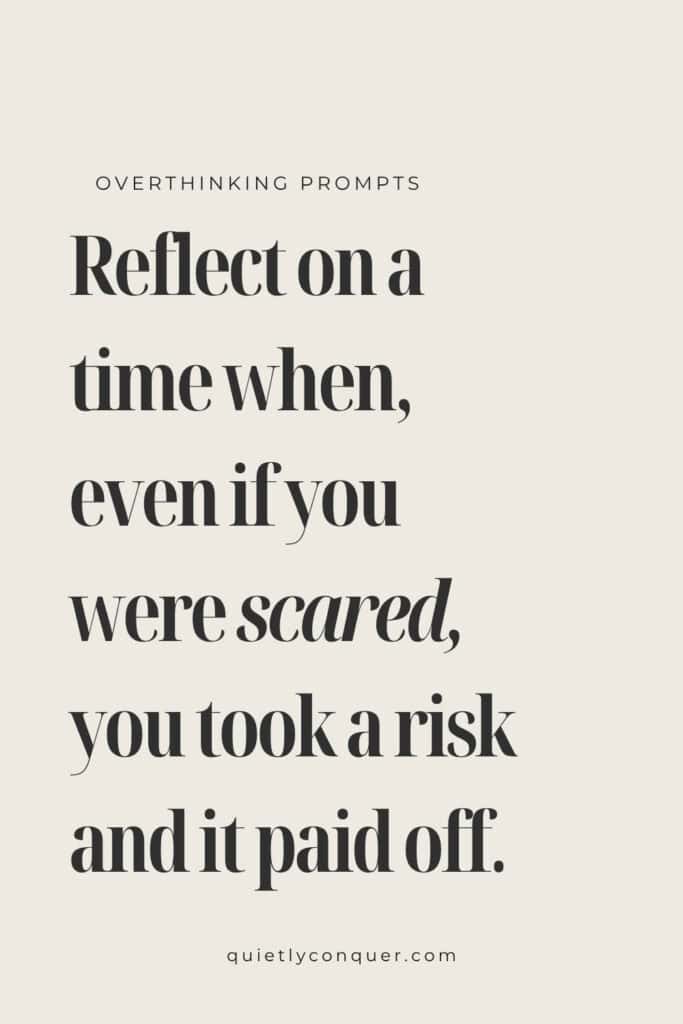
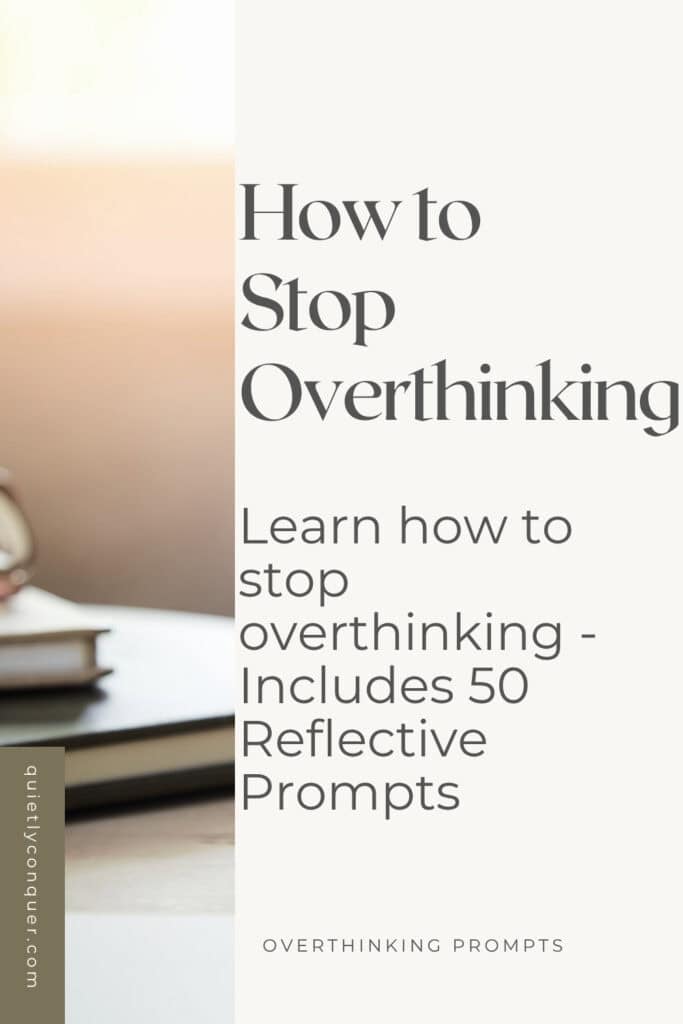
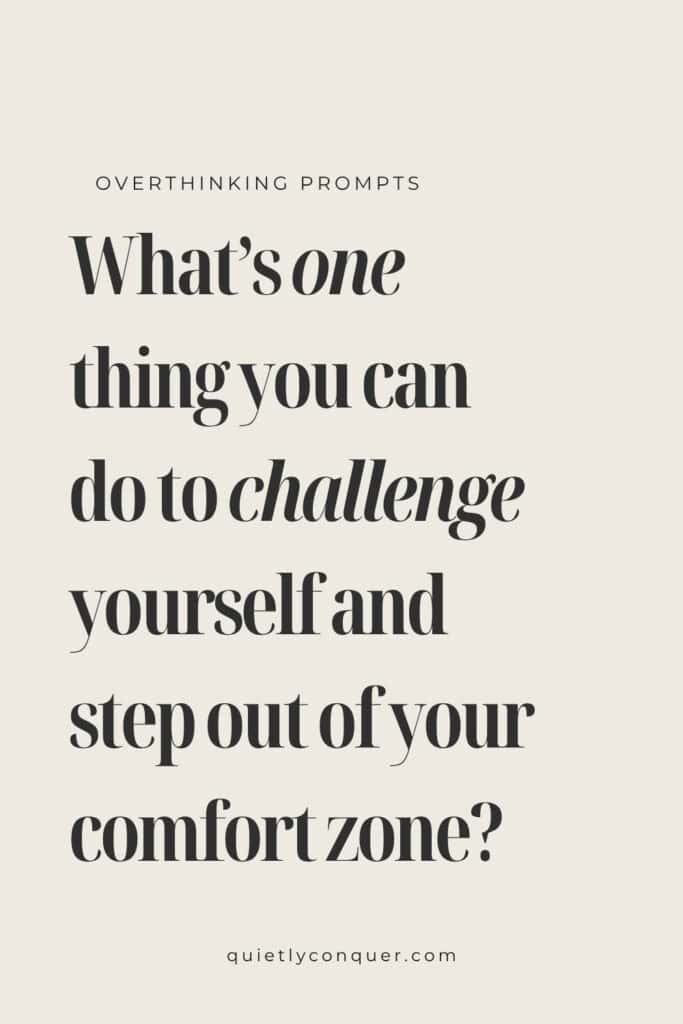
Meet Lynsey

Hey there! I'm Lynsey, a counsellor, coach and mentor for women who want to create change, but are feeling lost, uncertain and exhausted. With over 7 years’ experience of training, running businesses, and over a decade as a tutor and adult trainer, I've learned the value of a gentle and intentional approach to work and life that energises you without draining all of your energy.
I've lived with ME/CFS since 2011, and since then re-trained as a counsellor, and achieved a distinction for my Masters in Counselling and Psychotherapy Practice; all while running 4 businesses!
How? Improving your mindset, finding acceptance in yourself, and developing a gentle, but solution-focused approach to achieving goals is key. Knowing that it's not about how fast you move, but finding your own pace and trusting that you can achieve your goals in your own way, one step at a time.
If you'd like to know more about working with me, you can email [email protected] or find me on socials (links in the menu)
Have you seen my online store Quietly Conquer – Find DFY templates, downloads and more!

